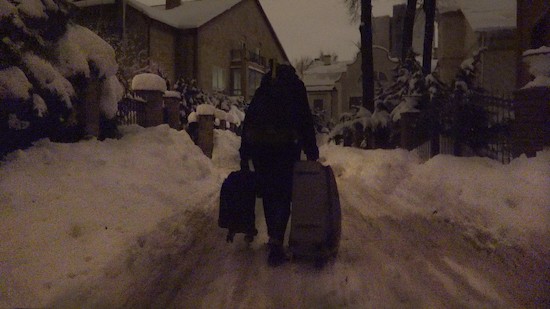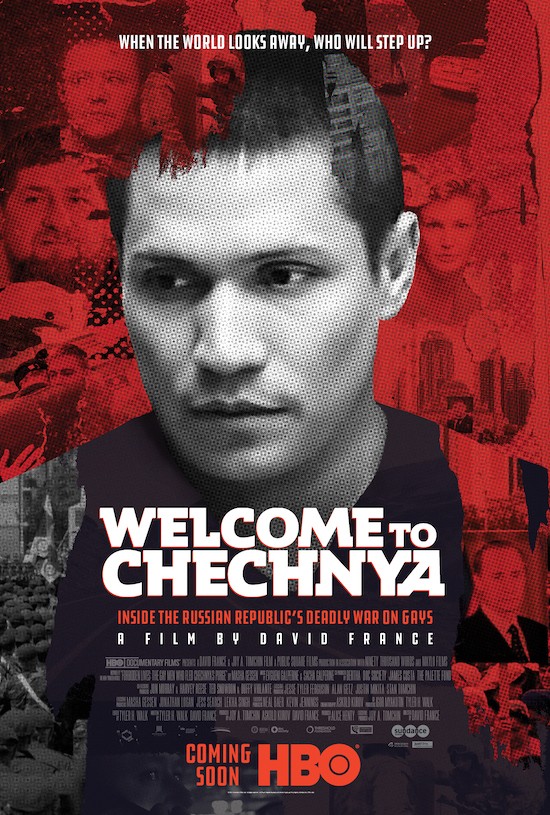Neal Baer on Diving into CRISPR for ‘Perspectives in Biology & Medicine’ and What Would Have Happened in DESIGNATED SURVIVOR Season 4
February 7, 2020 by Marisa Roffman

Credit: WELCOME TO CHECHNYA
After bringing CRISPR—clustered regularly interspaced short palindromic repeats, a tool which allows DNA to be edited—into the pop culture conversation with DESIGNATED SURVIVOR season 3, Neal Baer (who is also a doctor) dove deeper into the issue as the guest editor for a special issue of Perspectives in Biology & Medicine, a scholarly journal published by The Johns Hopkins University Press.
Baer is also lending his producing power to the Sundance documentary WELCOME TO CHECHNYA (which will air on HBO later this year), as the film tackles the continued attacks against the LGBTQ+ population in Russia and the activists who are working to combat the threats.
“Human rights issues are at the forefront of our lives now, and I’ve been really fortunate to be involved in these projects,” Baer says.
Here, he dives into why the CRISPR technology is so dangerous and how storytelling might be able to combat it, why he wanted to be a part of WELCOME TO CHECHNYA’s producing team, and what would have happened in DESIGNATED SURVIVOR’s fourth season.
What led to you guest editing this issue?
My interest in CRISPR in health care as a physician was what led me to do this storyline on DESIGNATED SURVIVOR. After I did that, I still felt that there just wasn’t any conversation going on: No Democratic presidential candidate has talked about it; the White House hasn’t talked about it.
There’s panic over coronavirus, and yet I think this is a much more worrisome problem then the coronavirus may likely turn out to be. That’s something that we’ll learn about and will possibly develop a vaccine for, like with MERS and SARS. But CRISPR isn’t predictable in the way that viruses are.
Scientific advances don’t just stop because you’re writing about the for a television show. What has advanced in CRISPR since you did the DESIGNATED SURVIVOR arc?
Well, certainly the announcement in China about using CRISPR to make a set of twins resistant to HIV caused an uproar and a lot of discussion. That hadn’t happened while we were writing the show, and that’s given scientists a lot of pause; there’s a lot of discussion about this now.
The other thing that’s happened is that there have been some medical treatments that are experimental on someone here with sickle cell disease and someone in Germany with beta thalassemia, which are two diseases that cause severe pain and suffering, and often shortened lifespans. And CRISPR has been used to treat these people so far successfully, which is really quite wonderful; I’m optimistic about that. The problem is that with the good comes the bad. And how we’ll be able to control the bad hasn’t been discussed at all.
That’s really what my show was about. [DESIGNATED SURVIVOR’s storyline] was not only just about it being used for heinous purposes, but it also was a commentary on the right and their fear of demographic change. So there’s been a lot that’s happening with CRISPR. What happens is we have waves of panic. So the panic right now is on coronavirus, and it’s not something to take lightly. But CRISPR is something that we need to take seriously and, unfortunately, I don’t think it’s in the purview nor the abilities of this administration to do it.
Given the good you noted is possible from this, what are the challenges in making sure the dangers of this technology is better known?
That’s by telling these stories. That we can change.
There are two ways that CRISPR can work: [uses like] the sickle cell treatment, which means that we treat the person using a CRISPR approach, but it doesn’t affect their offspring; we’re just changing the cells in their body, but not their reproductive cells.
Then there’s germline CRISPR, which was used on the twins when they were just an embryo. That means that if you do the CRISPR editing in the germline, or at an early embryonic stage, then that person that comes from that embryo will pass on that CRISPR gene to offspring. So that’s the big, big difference.
And this is all very complicated and complex to have to explain this to the public. So we can do that in shows, and try to be clear about [the differences].
Now, some people may say we should treat people with these diseases and change the germline so that they don’t pass these diseases on—and I give those reasons in my essay—because it’s cheaper to treat somebody and not have them pass the disease on. But there’s so many questions in terms of not only the safety, but what are the environmental repercussions? We don’t really know. So it’s a it’s a hugely complex arena. When I hear that the public isn’t really engaged in the impeachment hearings and trial, one worries how will they be engaged in this.
But what Ben Hurlbut points out in his piece is that science moves forward and ethics follows rather than vice versa. And then’s it’s like, “Oops, we’ve already done this. So now that the cat’s out of the bag, Pandora’s box is open, how are we going to deal with this?” As opposed to “Should we be doing this?” And I think we’re at this place where we still have some time to say, “Should we do this?”
I imagine that window is probably closing fast…
Closing very fast. And I think we made all the points on our show pretty clear [what happens] if we don’t have some laws in place that prevents people from just ordering different DNA sequences so that they can CRISPR together smallpox or make all kinds of viruses that we’ve never even heard of before. We need to put some laws in place. And I write about that in my piece as well.
In addition to the issue of Perspectives in Biology and Medicine you edited, you also executive produced a documentary, WELCOME TO CHECHNYA, which recently won the U.S. Documentary Special Jury Award for Editing at Sundance and will be coming to HBO later this year. What made you want to be a part of that film?
We’re going to Berlin for the Berlin Film Festival. I was drawn to the project because David France had done [the 2012 documentary] HOW TO SURVIVE A PLAGUE, which was nominated for an Oscar, and I was a real fan of his work; I thought it was really important. And he also did a film about Marsha P. Johnson [the documentary THE DEATH AND LIFE OF MARSHA P. JOHNSON], who was one of the first trans activists who was out and outspoken. So I’ve been involved in human rights issues surrounding LGBTQ people.

Credit: WELCOME TO CHECHNYA
Human rights is a public health issue. As a physician, I think it’s incumbent on me to talk about these public health issues. When you are beating people, often to death, and harming them, you’re taking away their health. It’s good to frame this atrocity in Chechnya as a public health issue, as well as the human rights issue. And I am really amazed of how many people have never heard about this.
[In the documentary] we had to protect the identities of people who had escaped, because they fear for their lives around the world, still, because of the monstrous president of Chechnya, who thinks it’s really kind of a joke to say, “Get rid of gays” and and laugh about it as he does in the film—with the support of Putin.
We do make a point that 151 people got out so far. They’ve been welcomed in Canada, France, and Germany, but the Trump administration has taken zero. So, I think that speaks to Trump’s involvement with Putin and Russia, to not make a statement about what’s happened.
The movie has evidence of what’s going on. It’s not about hearsay; somebody came forward who had escaped. And he took his case before the Russian courts and lost because there was no supportive witnesses, because witnesses are too fearful to come forward. Though he did have evidence of his own beatings and and that was just dismissed. So we have our work cut out for us to tell these stories both about CRISPR and about Chechnya, or [other] human rights abuses.
The story in Chechnya is unfortunately still ongoing. What made the time right for the documentary to be released now?
David wanted to tell the story as quickly and urgently as possible; there are enough examples, definitely. The film follows a number of people who get out of Chechnya. I think the point’s been made and now it’s time to take action.
I have a web platform called actionlab.org, which bridges the gap between inspiration and action. I [wrote the afterword] on a book on soda and the soda industry [called “Soda Politics: Taking on Big Soda (And Winning)”] so we have a campaign on that. Or I did a documentary that was on Netflix and PBS called IF YOU BUILD IT about kids who build a farmers market to save their town, and we give people actionable steps to do that. So when you see something like this film, then we give you actionable steps right away.
On a more fictional note, DESIGNATED SURVIVOR won’t return for a fourth season. What would you have tackled there if the show had been renewed?
In season 4 my plan was to take on the Equal Rights Amendment. I was going to make Italia Ricci’s character, Emily, a news pundit and have her go toe to toe with [Kiefer Sutherland’s] Kirkman.
I was thinking about bringing Kirkman’s son, Leo, back from Stanford, because he has a psychotic break; it turns out that his son is diagnosed with schizophrenia. The White House [then] has to deal with a child who has a severe mental illness and what that means. I thought that would be really interesting: would they cover it up, would they talk about it, would Kirkman become sort of a leader in that [arena]?
I was going to have [Anthony Edwards’] Mars’ wife, Lynn [played by Lauren Holly], run for senator, win, and go against—in many ways—Kirkman. That was going to put Anthony Edwards’ character in a bind because he was going to be caught between his wife, whom he had very much supported and and come to terms with her addiction, and come to terms with his own ambitions, and Kirkman, then deal with that.
[With Kirkman,] we would have found out that it wasn’t just Emily, but he had talked to the FBI, as well. We had plans for [Julie White’s] Lorraine, too. She wasn’t just necessarily going to sit in jail, but I’ll leave it at that so people can wonder.
RELATED:
- Neal Baer Reflects on Robin Williams’ LAW & ORDER: SPECIAL VICTIMS UNIT Guest Spot
- Neal Baer on ER and LAW & ORDER: SPECIAL VICTIMS UNIT’s Milestone Anniversaries
- DESIGNATED SURVIVOR Boss on Season 3’s Big Tragedy
- DESIGNATED SURVIVOR: Neal Baer on Staging an ER Reunion, Kirkman’s Re-Election Campaign
Follow @GiveMeMyRemote and @marisaroffman on Twitter for the latest TV news. Connect with other TV fans on GIVE ME MY REMOTE’s official Facebook page.
And be the first to see our exclusive videos by subscribing to our YouTube channel.
As an Amazon Associate we earn from qualifying purchases made through links/ads placed on the site.
Related Posts
Filed under Designated Survivor
Comments Off on Neal Baer on Diving into CRISPR for ‘Perspectives in Biology & Medicine’ and What Would Have Happened in DESIGNATED SURVIVOR Season 4



Comments